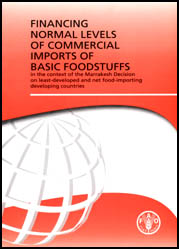 |
FINANCING
NORMAL LEVELS
OF COMMERCIAL
IMPORTS OF
BASIC FOODSTUFFS
in the context of the Marrakesh Decision
on least-developed and net food-importing
developing countries
|
|
Commodity Policy and Projections Service
Commodities and Trade Division
FOOD AND AGRICULTURE ORGANIZATION OF THE UNITED NATIONS
Rome, 2003
|
|
Table of Contents
|
|
|
The designations employed and the presentation of material in
this information product do not imply the expression of any opinion whatsoever
on the part of the Food and Agriculture Organization of the United Nations
concerning the legal or development status of any country, territory, city or
area or of its authorities, or concerning the delimitation of its frontiers or
boundaries. |
|
All rights reserved. Reproduction and dissemination of material in this
information product for educational or other non-commercial purposes are
authorized without any prior written permission from the copyright holders
provided the source is fully acknowledged. Reproduction of material in
this information product for resale or other commercial purposes is prohibited
without the written permission of the copyright holders. Applications
for such permission should be addressed to the Chief, Publishing Management
Service, Information Division, FAO, Viale delle Terme di Caracalla, 00100
Rome, Italy or by e-mail to [email protected]
|
© FAO 2003
PREFACE
ACKNOWLEDGEMENTS
ABBREVIATIONS AND
ACRONYMS
EXECUTIVE
SUMMARY
INTRODUCTION
Chapter I: FOOD IMPORTS OF NET
FOOD-IMPORTING DEVELOPING COUNTRIES
A. The importance of food
imports
B. Major food trade
flows
Chapter II: THE MAJOR PLAYERS IN
INTERNATIONAL FOOD TRADE
A. International trade
houses
B. Grain-exporting state trading
entities
C. Private importers
D. State-owned food import
agencies
E. Commercial banks
F. Export credit and insurance
agencies, and export-import banks
Chapter III: FOOD IMPORT FINANCING
TECHNIQUES
A. Overview
B. Seller’s credit
C. Usance and deferred Letters of
Credit
D. Bank loans to
importers
E. Commercial paper
F. Forfeiting
G. Counter trade and Bilateral Payment
Agreements
H. Warehouse receipt
finance
I. Islamic finance
Chapter IV: FOOD IMPORT FINANCING
PRACTICES
A. Open account sales
B. Documentary
collection
C. Sales under letter of credit
conditions
D. Transactions under counter trade
and Bilateral Payment Arrangements
E. Warehouse receipt
finance
F. Intra-firm trade
G. Cash-paid imports by major
corporate and government-owned entities
Chapter V: WEAKNESSES IN
INTERNATIONAL FOOD TRADE FINANCING SYSTEMS
A. Trade driven by long-term corporate
relations, on open account terms
B. Exports by state
entities
C. Transactions under Bilateral
Payment Arrangements
D. Private sector imports using
warehouse receipt finance
E. Imports through international
traders’ local offices
F. Conclusion
Chapter VI: AN INTERNATIONAL
“REVOLVING FUND” FOR FINANCING FOOD IMPORTS
A. Obstacles to financing food imports
in developing countries
B. The effect of sudden new food
import needs
C. The need for a food financing
facility
D. Providing funds at the time of need
for increased food financing
E. How could a market-friendly food
financing facility be structured?
Annex 1: Marrakesh Ministerial
Decision
Annex 2: Production, exports and
imports of cereals and vegetable oils and oilseeds
Annex 3: Trade flows for wheat,
maize, rice, palm oil and soybean oil
Annex 4: Major international grain
and vegetable oils trading companies
Annex 5: Major state trading
companies - food exports
Annex 6: Major state trading
companies - food imports
Annex 7: Major export credit
agencies for world food trade
Annex 8: Food import profiles of Least-Developed
Countries (LDCs) and Net Food-Importing Developing Countries (NFIDCs)
List of LDCs and NFIDCs
LDC (Least Developed Countries) (Weighted by reliance
on imports)
NFIDC (Not Food Importing Developing Countries (Weighted
by reliance on imports)
Afghanistan
Angola
Bangladesh
Barbados
Benin
Bhutan
Botswana
Burkina Faso
Burundi
Cambodia
Cape Verde
Cent Afr Rep
Chad
Comoros
Congo, Dem R
Cote d'Ivoire
Cuba
Djibouti
Dominica
Dominican Rep.
Egypt
Eq Guinea
Eritrea
Ethiopia
Gambia
Guinea
Guinea-Bissau
Haiti
Honduras
Jamaica
Jordan
Kenya
Kiribati
Lao People's Dem. Rep.
Lesotho
Liberia
Madagascar
Malawi
Maldives
Mali
Mauritania
Mauritius
Morocco
Mozambique
Myanmar
Nepal
Niger
Pakistan
Peru
Rwanda
Samoa
Sao Tome Pm
Senegal
Sierra Leone
Solomon Is
Somalia
Sri Lanka
St Kitts Nev
St Lucia
St Vincent
Sudan
Tanzania
Togo
Trinidad Tob
Tunisia
Tuvalu
Uganda
Vanuatu
Venezuela
Yemen
Zambia
How to Order
